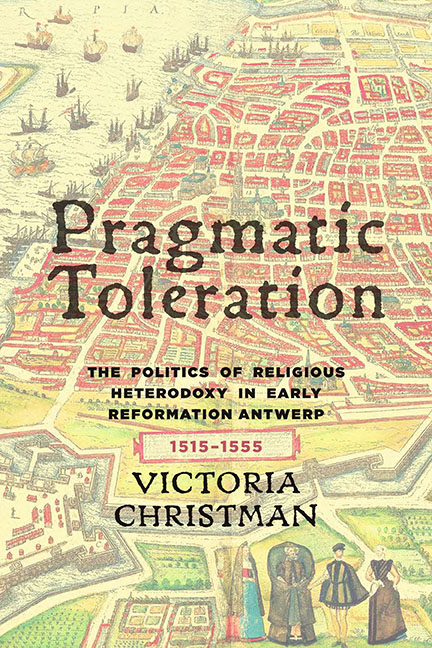Book contents
- Frontmatter
- Dedication
- Epigraph
- Contents
- Acknowledgments
- Introduction
- 1 The Lay of the Land: Government and Law in Brabant
- 2 Undercover: The Claes vander Elst Conventicle
- 3 Pragmatic Intolerance: Antwerp's Anabaptists
- 4 People of the Book: Heterodox Printers and Publishers in Antwerp
- 5 Between Stage and Scaffold: Rederijker Trials in Antwerp
- 6 Trade in Tolerance: The Portuguese New Christians in Antwerp, 1526–50
- Conclusion: Rulers and Religious Renegades
- Appendix 1 Chronology of Antiheresy Legislation in Brabant
- Appendix 2 Answers at Ghent
- Abbreviations
- Notes
- Bibliography
- Index
3 - Pragmatic Intolerance: Antwerp's Anabaptists
Published online by Cambridge University Press: 15 March 2018
- Frontmatter
- Dedication
- Epigraph
- Contents
- Acknowledgments
- Introduction
- 1 The Lay of the Land: Government and Law in Brabant
- 2 Undercover: The Claes vander Elst Conventicle
- 3 Pragmatic Intolerance: Antwerp's Anabaptists
- 4 People of the Book: Heterodox Printers and Publishers in Antwerp
- 5 Between Stage and Scaffold: Rederijker Trials in Antwerp
- 6 Trade in Tolerance: The Portuguese New Christians in Antwerp, 1526–50
- Conclusion: Rulers and Religious Renegades
- Appendix 1 Chronology of Antiheresy Legislation in Brabant
- Appendix 2 Answers at Ghent
- Abbreviations
- Notes
- Bibliography
- Index
Summary
The case of the Claes vander Elst conventicle highlights the unintentionally lenient treatment of a group of heterodox thinkers who benefited from the confusion in the law throughout the 1520s. One feature of the new legislation introduced by Margaret in 1529 was that it was far more specific in terms of both the crimes that were to be punished and the penalties that were to be imposed. After this promulgation, it became increasingly rare for religious offenders to benefit from the kind of accidental toleration that the vander Elst conventiclers enjoyed. One of the arguments of this book is that the rulers of Antwerp rose to the challenges posed by Margaret's legislation by developing new avenues through which to exercise their policies of pragmatic toleration. One of the predominant features of the tolerant practices they developed was their selectivity. Had the municipal authorities treated every religious offender with mercy, their toleration would have been universal rather than selective. But they were legally generous only to those offenders who they viewed as being in some way beneficial to the city as a whole, such as influential publishers or wealthy merchants, of whom we shall hear more in chapters 4 and 6. Those who possessed no such value or worse, who were perceived as a threat, the councilors treated with all the legal severity at their disposal. Thus, the necessary counterpoint to the pragmatic toleration of the Antwerp officials was their pragmatic intolerance, the unavoidable underside of their selective policy. The most glaring example of the limits of their pragmatic toleration was their treatment of Antwerp's Anabaptists.
The history of the various Anabaptist movements in Europe generally, and in the Low Countries in particular, is a story with a vast historiography. The discussion that follows here is in no way an attempt to provide even an overview of that history, which would require a separate monograph. Indeed, it could be argued that the story of the Anabaptists in the Low Countries has no place in a book about religious tolerance. The example of the Anabaptists is included here, however, to demonstrate clearly that the tolerant practices of Antwerp's rulers were in no way intended to be universal.
- Type
- Chapter
- Information
- Pragmatic TolerationThe Politics of Religious Heterodoxy in Early Reformation Antwerp, 1515–1555, pp. 56 - 68Publisher: Boydell & BrewerPrint publication year: 2015

